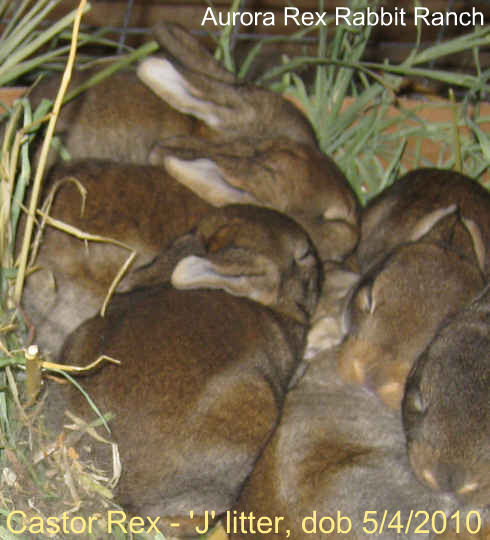Rabbit Rhythms of October
The huge differences between the many domestic rabbit breeds today is a result of intentional selective breeding.
 The rabbit's genetic code contains duplicates of every trait and is in most cases very complex. In addition to the actions of the genome, modifying factors contribute to or adjust the various genetic signals.
The rabbit's genetic code contains duplicates of every trait and is in most cases very complex. In addition to the actions of the genome, modifying factors contribute to or adjust the various genetic signals.
(Compare the relative uniformity of color in this litter with the color of the kits in the photo below. Selective breeding can improve color in the offspring, and therefore throughout the rabbit herd, eventually.)
The wise use of selective breeding concentrates the desirable genetic information in the offspring and lets fall to the wayside the genes that fail to further the particular breeding program or rabbit breed.
Breeders have been selectively breeding for years; perhaps you are as well.
- Suppose you wish to raise tiny rabbits. Imagine a tiny 2.5 pound rabbit achieved solely by selectively breeding the smallest rabbits, without the use of a dwarfing gene.
- You can also breed for performance. Body type and bone structure might be important to you, but how about mothering ability? Under normal circumstances, rabbits should have no problems knowing how to care for their first litters. Wouldn’t it be great to never have to worry about whether or not your doe will kindle inside the nest box?
You can breed for color, fur type, wool characteristics, lopped or erect ears. You can carefully select to rid your herd of a recessive autosomal defect.
There’s nothing very magic about selective breeding, but it works miracles when managed correctly.
Read the entire article at Selective Breeding
Overheard...
Rabbits are herbivores; humans are not. Liz, a visitor to Raising-Rabbits, disagreed:
"I would like to question you on the correctness of your analysis of a human's natural diet," she wrote. "According to the scientific observation of a human's organs of digestion, the formation of his teeth and observation of his organs of sense, it can clearly be inferred that humans are by their natural design frugivorous animals, and definitely NOT carnivorous or omnivorous as you wrongly state.
"I do have the evidence to show you but I need to attach 3 pages for you to read. Once you reply to my email, I will attach the relevant information for you to look at."
I showed Liz my rabbits and their intestines to help provide her with answers. Listen in for a lesson in rabbit anatomy and physiology at the very least, and learn why rabbits don't need extra vitamins.
I replied:
"Help me understand: A frugivore diet does not supply vitamin B12, yet I will eventually die if I cannot obtain this vitamin over time. How then can I possibly be a frugivore?
"Our human bodies need certain vitamins -- that is why they are called vitamins (‘vital amines’) -- and one of these happens to be Vitamin B12. Yet there are no active plant sources of vitamin B12.
"Extensive research and testing of vegetarian sources of vitamin B12 over the last 30+ years have demonstrated one by one that there is almost zero biologically active B12 to be had through vegetable sources. Traces. Maybe. Most certainly not enough to support today’s high numbers of herbivore and carnivore populations."
How then do herbivores get their own B12 and other vitamins? The rest of this conversation is encapsulated and illustrated over at our Herbivore page.
Liz never wrote back; it would have been interesting to see the pages she referenced.
Rabbits in the News
Have you ever wondered how people raise rabbits in other countries? Take a peak into a Kenyan rabbitry at this link. See how they house their rabbits and feed them with a combination of pellets and local forages of many sorts.
The article also includes a very interesting video tour of the enterprise.
Very cool!

